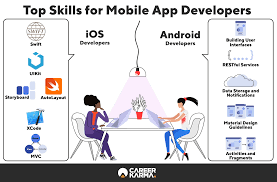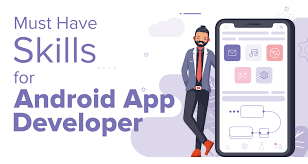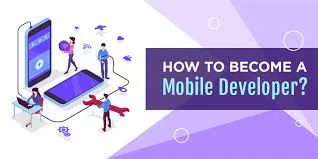To become a mobile app developer in the USA, start by earning a bachelor’s degree in computer science or a related field, providing a foundational understanding of software development. Master essential programming languages like JavaScript and TypeScript for cross-platform development, along with Swift (iOS) and Kotlin/Java (Android) for native app creation. Familiarize yourself with popular frameworks like React Native, Flutter, and NativeScript to build versatile applications.
Develop a strong portfolio showcasing your projects and collaborate on open-source initiatives. Attend networking events and leverage online platforms like LinkedIn to connect with professionals in the field. Gain practical experience through internships or entry-level positions, emphasizing real-world application of your skills.Consider supplementing your education with online courses or coding bootcamps to accelerate your learning. Hone soft skills such as communication and problem-solving. Stay abreast of industry trends and continuously update your skills. Prepare for interviews by practising coding exercises and showcasing your projects. Actively search for job opportunities on various platforms and company websites. Finally, build a clear career path, specializing in areas that align with your interests, and maintain a commitment to lifelong learning to thrive in this dynamic field.
Who Is A Mobile App Developer?
A mobile app developer is a skilled professional responsible for creating, designing, and programming applications for mobile devices. These devices include smartphones, tablets, and other portable gadgets. Mobile app developers use various programming languages, frameworks, and tools to build functional and user-friendly applications tailored to the specific requirements of the target platform.
Their role involves understanding the client’s needs, conceptualizing app functionalities, and translating these ideas into code. Mobile app developers work with different operating systems such as Android and iOS, adapting their development approach accordingly. They collaborate with UI/UX designers to ensure a visually appealing and intuitive user interface.
The responsibilities of a mobile app developer also include testing applications for functionality, identifying and fixing bugs, and optimizing performance for a seamless user experience. Continuous learning is crucial in this field due to the rapid evolution of technology, and developers often stay updated with the latest trends and tools in mobile app development.
Why Become a Mobile App Developer?
Choosing a career as a mobile app developer offers a dynamic and rewarding path in the technology industry. This profession provides an opportunity to craft innovative solutions that impact people’s daily lives. Mobile apps have become integral to various sectors, from healthcare to entertainment, making app development a versatile and sought-after skill.
Being a mobile app developer allows you to bring your creative ideas to life, contributing to the evolution of technology. The demand for skilled developers is continually growing, ensuring a stable and potentially lucrative career. This role also fosters continuous learning as technology advances, keeping professionals engaged and up-to-date.
Moreover, mobile app development offers the chance to work independently or collaboratively, providing flexibility in your work style. With the potential to reach a global audience, app development empowers you to make a meaningful impact on a large scale. Overall, becoming a mobile app developer is a gateway to a vibrant, challenging, and impactful career in the ever-evolving landscape of technology.
How to Become a Mobile App Developer?

Embarking on the journey to become a Mobile App Developer entails mastering coding languages, delving into app development frameworks, and staying updated on emerging technologies. Aspiring developers often start by learning fundamental languages like Java or Swift for Android and iOS platforms, respectively. To broaden their skill set, they explore app development frameworks such as React Native or Flutter for cross-platform proficiency.
Hands-on projects, involvement in open-source initiatives, and a robust project portfolio are essential components for showcasing practical skills. Continuous learning is crucial, achieved through staying informed on industry trends, attending conferences, and engaging in developer communities.
While formal education, such as computer science degrees or specialized courses, is valuable, self-directed learning and personal projects play a pivotal role. Networking with experienced developers, seeking mentorship, and participating in hackathons are effective strategies for accelerated learning and gaining practical insights.
How To Get A Job As A Mobile App Developer?

Embarking on a career as a Mobile App Developer requires a strategic approach to skill development, practical experience, and effective job search strategies.
Master Core Technologies :
To begin your journey, acquire a strong command of essential programming languages, such as Java for Android or Swift for iOS. Familiarize yourself with popular frameworks like React Native or Flutter.
Build a Robust Portfolio :
Create a diverse portfolio showcasing your mobile app development projects. Highlight applications that demonstrate creativity, innovation, and problem-solving skills. A compelling portfolio is crucial for catching the eye of potential employers.
Stay Current with Industry Trends:
The tech industry evolves rapidly. Stay updated on the latest trends, tools, and best practices in mobile app development. Continuous learning is key to remaining relevant in the field.
Engage in Continuous Learning:
Enroll in online courses, attend workshops, and pursue certifications to enhance your skills. A commitment to continuous learning is a testament to your dedication to staying ahead in a dynamic field.
Work on Real-world Projects:
Apply your skills to practical scenarios by working on real-world projects. Whether it’s a personal project or collaboration with others, this hands-on experience demonstrates your ability to implement solutions and overcome challenges.
Participate in Coding Communities:
Join online coding communities, attend local meetups, and contribute to open-source projects. Networking with fellow developers can provide valuable insights, support, and potential job opportunities.
Seek Internships or Entry-level Positions:
Consider internships or entry-level positions to gain industry experience. These opportunities allow you to apply your skills in a professional setting, build a network, and enhance your resume.
Build a Professional Network:
Attend industry events, conferences, and networking sessions. Connect with professionals in the mobile app development field, and seek mentorship from experienced developers. A strong professional network can open doors to job opportunities.
Tailor Your Resume:
Craft a targeted resume that highlights your relevant skills, experiences, and accomplishments. Tailor it to each job application, emphasizing how your background aligns with the specific requirements of the position.
Prepare for Technical Interviews:
Practice coding challenges, algorithms, and system design questions. Technical interviews are common in the tech industry, and preparation is essential to showcase your problem-solving abilities.
Showcase Soft Skills:
In addition to technical skills, emphasize soft skills such as communication, teamwork, and adaptability. Mobile app development often involves collaboration, and employers value developers who can effectively communicate and work in a team.
Develop a Strong Online Presence:
Create a professional online presence through platforms like LinkedIn and GitHub. Showcase your projects, contributions, and skills. Many employers actively seek candidates with a visible and positive online presence.
By combining technical proficiency with practical experience, continuous learning, and effective networking, you can position yourself for success in securing a job as a Mobile App Developer.
Essential Competencies for Mobile App Developers

Mobile app developers play a crucial role in shaping the digital landscape, and acquiring essential competencies is paramount for success in this dynamic field. Proficiency in programming languages such as Java, Swift, or Kotlin is fundamental. These languages serve as the building blocks for crafting robust and efficient mobile applications. Adept problem-solving skills are equally vital, as developers often encounter challenges during the app development life cycle.
A deep understanding of mobile platforms, including iOS and Android, is imperative. Developers must stay abreast of platform-specific guidelines and design principles to create seamless user experiences. Moreover, familiarity with cross-platform frameworks like React Native or Flutter expands a developer’s toolkit, enabling the creation of applications that function across various devices.
Mobile app security is a critical concern in today’s digital landscape. Developers must possess knowledge of secure coding practices and be vigilant about potential vulnerabilities. Keeping up with the latest trends and emerging technologies is essential for innovation. Mobile app developers should be adaptable and open to incorporating new tools and methodologies into their workflow.
Effective communication and collaboration skills are essential for working in multidisciplinary teams. Mobile app development often involves coordination with designers, product managers, and quality assurance professionals. A developer’s ability to articulate ideas and understand the perspectives of others contributes to successful project outcomes.
In summary, a successful mobile app developer combines technical expertise with problem-solving skills, platform knowledge, security consciousness, adaptability to emerging technologies, and effective communication. These competencies position developers to navigate the dynamic landscape of mobile app development and deliver impactful, user-friendly applications.
FAQ’S
1.What educational background is required to become a mobile app developer in the USA?
While a formal degree in computer science or a related field is advantageous, it’s not mandatory. Many successful app developers are self-taught. Online courses, coding bootcamps, and relevant certifications can also provide valuable skills.
2.What programming languages should I learn for mobile app development?
For Android, Java and Kotlin are essential. For iOS, Swift and Objective-C are crucial. Additionally, cross-platform frameworks like React Native or Flutter are gaining popularity, allowing developers to use a single codebase for both platforms.
3.How important is hands-on experience in app development?
A: Extremely important. Building real-world projects enhances your skills and portfolio. Consider contributing to open-source projects, creating your apps, or collaborating on team projects to gain practical experience.
4.Are networking and collaboration important in the app development industry?
A: Yes, networking is key. Attend industry events, join developer communities, and connect with professionals on platforms like LinkedIn. Collaboration is essential as app development often involves multidisciplinary teams.
5.Is it necessary to stay updated on industry trends and technologies?
A: Yes, staying current is crucial. The tech industry evolves rapidly, and awareness of the latest trends, tools, and frameworks is vital for building competitive and innovative mobile apps.


















